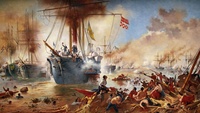Dr. Vitor Izecksohn will give a talk on his current research. Monday Feb.6, 2017, 12pm in the Department of History, SS623. Event is free and open to the public. Refreshments will be served.
Summary During the Paraguayan War (1864-1870), the Brazilian empire continued to hold elections at all levels, as mandated by the constitution, despite the wartime stresses around recruitment for the army and navy. An exception to this took place in 1867, during the efforts to create a new army corps in the frontier province of Rio Grande do Sul. The Council of State (an influential advisory body to Emperor Pedro II) recommended canceling elections in the province, an extreme measure taken to ensure that there would be no protests against conscription in the most militarized Brazilian province. This talk analyzes the rationale behind the councilors’ recommendation and the alternatives in light of the strains faced by that region during the third year of the campaign against Paraguay.
Dr. Vitor Izecksohn is a professor of history at the Universidade Federal do Rio de Janeiro. His research has focused on comparative history, historical sociology, and political theory. His first English-language book, Slavery and War in the Americas: Race, Citizenship, and State Building in the United States and Brazil, 1861-1870 (University of Virginia Press, 2014) analyzed how wartime recruitment refracted political dynamics at local, regional and national levels, and undermined the institution of slavery in the United States and Brazil. African-American enlistment, including free and freed men, affected the broader political legacies of both conflicts. The book stresses contradictions between struggles for state-building and the denial of active liberties to sectors of the male population, situating national trajectories in a framework of global regimes characterized by exclusionary forms of state-building. He has published two earlier books in Brazil: Guia de pesquisa: Pensamento liberal no Brasil (1990), a history of Brazilian liberal political thought in the twentieth century, and O cerne da discórdia: A Guerra do Paraguai e o núcleo profissional do Exército (The Core of the Disagreement: The Paraguayan War and the Army’s Professional Nucleus, 2002). He co-edited Nova História Militar Brasileira (2004). These books, along with his chapters and journal articles, engage in renewed debates about the new Brazilian military history and the internationalization of the American Civil War.
His current research examines the impact of state-building in the Argentine and Confederate national projects. Both of these remarkably different regions experienced duress over internal fragmentation and external disruption of international market networks. Although inspired by the global movement towards national organization (and international integration), internal strife, social and racial exclusion, and military defeat doomed these efforts.





